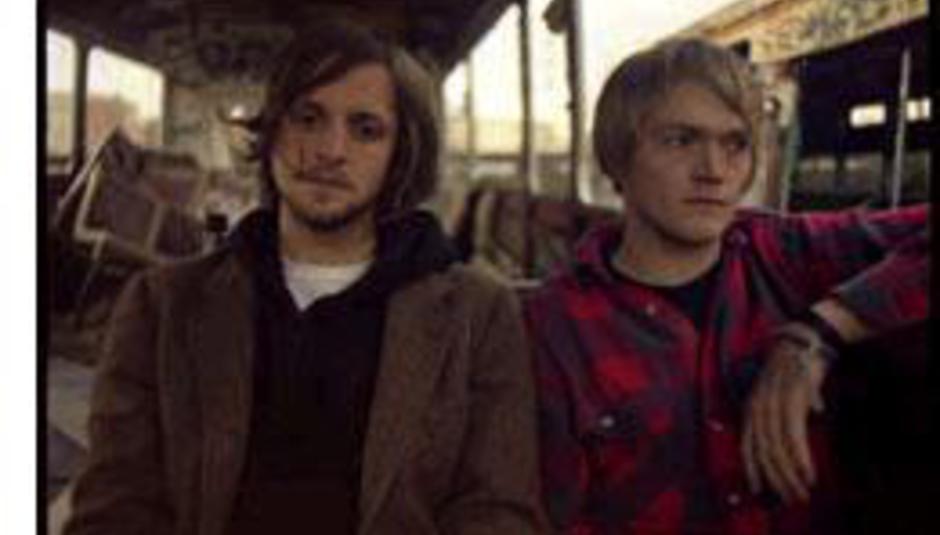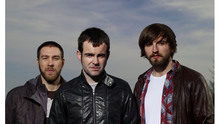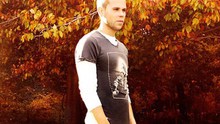DiS braves kick-out time on London's shopping mecca of Oxford Street to spend fifteen with Saddle Creek's 'folk-punks' Two Gallants. We find them burnt out by the February blues, about ready to call time on the UK's doom and gloom...
So we love the feeling of winning; everyone loves a winner, right? Right. But be totally honest to yourself: it’s the losers we so often side with, that we love so much more. Britain is a nation built on foundations of loss, a couple of World Wars aside; we’re forever celebrating our failures but failing to champion our champions. We’re almost too keen to be gallant losers, proud of our nears and oh-so-fars (but the odds were mighty). Beside me tonight stand two men utterly washed out, bleached and tattered about the edges, looking absolutely like archetypal losers; like their prize was stolen from them seconds before it was assured, or their horse fell a fence from home with the mortgage weighing its already heavy shoulders down. Half-smiles and vacant stares: this is how I meet Two Gallants.
“Gallant”: courageous, daring. In some ways these boys – it’s only the rough chins that belie each member’s early-twenties age – are flying bravely in the face of convention, daring each and every critic that’s assigned to offer critique on either of their albums to date, 2005’s The Throes and its Saddle Creek-released successor of 2006 What The Toll Tells, to compare them to a peer, to some sound-alike that’ll offer readers a foothold, a hook to hang these wares upon. Good luck, they’ll offer with a wicked smile; you see, nothing much today sounds like Two Gallants. Their music is deeply rooted in soil so archaic that most mainstream writers are simply too young to have prior knowledge of their influences, of the pioneers of this ramshackle, steady-rocking punk-cum-blues riot, bluegrass sucking grass smoke through a gauze of sweet aniseed. I’m one such writer, honestly ill educated in the acts that have lead to this: a final show of a successful UK tour, at the 100 Club in the very heart of London.
I fear I won’t make it, though, at least not on time: the scheduled slot, as it were, slips by as I weave in and out of expelled Oxford Street shoppers, each one a good foot or so wider now than they were an hour earlier, fattened by bags about their sides; everybody is looking one way but walking another, and the frustration is almost unbearable, relieved only when I sweep through unlocked glass doors and descend the famous jazz club’s stairs. A poster on the wall advertises an upcoming Chas and Dave show – by my reckoning they’re the only vaguely rock and roll duo Two Gallants haven’t at one time or another been compared to.
No one meets my stare as I step into the still fully lit venue; the support band are about to begin their soundcheck, there’s Young’s Special on tap at the bar, the sound man is wearing trousers that a man of his quite obvious age has no right to wear. Nobody says a word, or nods my way; this backpack could house a bomb and no one would be any the wiser until a switch was flicked and boom, adios the Central Line. Courage comes in a flash, a man with two guitar cases in hands of spindly fingers is approached: “Where’s Jacob?”
Jacob’s the tour manager, but that doesn’t matter: the man I’ve forced our presence upon is Adam Stephens, guitarist and singer of the pair; Tyson Vogel bashes the drums, often literally so. I scoot ‘backstage’ (i.e. to a cramped room in front of it). Now, rewind time to that first paragraph: I’m stooping over the aforementioned bag, dipping into its dark insides for something like a tape recorder, while Stephens and Vogel huddle together, like small animals threatened by a predator, by the rider for the night. They’re pale, almost ill-looking in fact, and barely touch the dips and crisps before them; though they each pluck a beer when the tour manager comes clunking, crates in hand, in halfway through our brief interview. Priorities, they seem to be in place. Stephens sinks to the floor while Vogel perches on a bench, the only real seating in what’s basically a hallway. The singer sighs: “I’m so sick of England…”
“What’s that?”
“I’m so sick of England… oh, no, don’t print that.”
“It’s okay. At this time of year the English hate England.”
They can be forgiven: fifteen British Isle dates in the February gloom will do this to any man or woman that calls the sunshine of San Francisco home, however little they’re actually there. Two Gallants, you see, are natural wanderers: they toured about the States under their own steam – every show booked by them, every floor to crash on arranged as little as an hour in advance – in support of The Throes. They’ve done D.I.Y., thank you very much. Now though, with Saddle Creek behind them, they’re enjoying some degree of professional structure; their band has become their career, for now at least. To look at their faces, though, drained of colour and taut of skin, you’d think they’d spent the last fifteen nights digging graves for their nearest and dearest. I proceed regardless of whatever is, or isn’t really, haunting the pair at this particular time; Stephens’ voice barely registers when the tape’s played back, such is his apparent desire to do something, anything, else than talk shop on the night of their last UK show. He’s polite, hospitable, but elsewhere up there; Vogel, meanwhile, runs his fingers through his long, jet-black hair for the duration, like a nervous child waiting to see a headmistress. Both look like they need a shower, a good meal and a little TLC. Neither are getting it right now…
What The Toll Tells seems to have arrived very soon after your debut, The Throes, so much so that there’s been a crossover of reviews in the media, and a degree of interviewer confusion as to which is the ‘now’ release. Why’s that?
Vogel: I don’t think there’s been that much confusion…
Stephens: There was an interviewer – some chick – that didn’t know anything. I just think some people simply don’t know about The Throes. Nobody reviewed it very well…
Do you think that you’d maybe be able to re-issue it properly over here, if this album does okay for the powers that be?
Stephens: I dunno, I mean… I dunno how we would do that. Well, we’ve been talking about maybe remixing it…
And were the two records recorded closely together?
Vogel: They were recorded at least a year apart.
Stephens: We spent a year touring, and last year we kinda toured everywhere… oh, we don’t know anything… our memories are like black holes.
Vogel: I know it was, like, a year in between, or nine months. We’ve been touring a lot in America.
So is this hectic touring wearing you out? Are you getting to the point where you’re thinking, “Fuck this, let’s go home…”?
Stephens: Yeah… no! I mean, we have moments… I dunno.
Vogel: I feel like we want to do this, but that doesn’t mean we don’t wanna go home.
Stephens: Sometimes touring can be really bad, but sometimes there’s nowhere I’d rather be. I’ve been in England far too long…
The band have the next day off to explore whatever parts of London they choose; looking at them, though, you hope they’ll give themselves a lie in. After their recuperation, in whatever form, they’re off to Europe for a further three weeks. You’d say that Saddle Creek was working them hard, taking full advantage of the fact that a two-piece band equals cheaper cargo costs and fewer plane, train or automobile seats to book; the fact is, though, that this is Two Gallants’ life; this is what they’ve chosen, independently of outside persuasion, and it’s an attitude reflected by What The Toll Tells. It’s a record short on compromises: sure, the stomping opener ‘Las Cruces Jail’, the lead single, is the kind of song any label, major or not, would love to hear from a new act – full of grit and possessing a brutal grace, a hard and impenetrable shell of confrontational guitar lines wrapped about a heart that, occasionally, reveals its true vulnerability – but elsewhere the album weaves wonderfully wayward trails. No fewer than four of the nine songs stretch to eight minutes or more, which isn’t exactly something you’d expect from, say, The White Stripes (a band that Two Gallants have been compared to, frequently, but more on that in a moment).
A few reviews have criticised the duo’s inability to edit their own work, to produce something that’s more in line with many a modern album: twelve-or-so similar songs ripe for selective downloading in today’s strange new consumer environment, where an album is never a standalone piece of art but a compilation of bite-size chunks. Rightly, the band are keen to stress that such a move isn’t premeditated; that these long, slowly developing songs aren’t designed solely to irritate those requiring a quick fix.
The new record contains a number of songs that go on for over eight minutes: was this a natural progression from the shorter songs of The Throes, or did you harbour any prior desire to make songs of greater depth, and length?
Stephens: Well, we’re not that conscious, as a band, which I think is a misunderstanding that many people have. I always think that a band, universally, is thought of as being deliberate: ‘This record is going to be like this, and this one like this’. We’re not like that at all. We just try to let the songs do their own thing.
And what about the lyrical content of the songs? Many are delivered like stories, containing experiences that you simply can’t have had – on one song, ‘Long Summer Day’, you sing from the point of view of a black slave, for example. Where are you finding inspiration for these words, for these tales?
Stephens: I’m sorry – I don’t want to shoot your question down – but I don’t think it comes as something strategic. It’s not some sort of equation: the songs do just write themselves. It’s not like I’m gonna wake up tomorrow and read, like, Keats or whatever…
But you must see things, or read things, that later work their way in some way or another into your lyrics?
Stephens: I think a lot of it comes from touring, and from living in a city like San Francisco, where there’s so much stuff going on.
He’s not wrong: Frisco gets a shout out as early as song number two on the new album, ‘Steady Rollin’. Stephens tells of shooting ‘his’ wife and later dropping her corpse in the nearby bay. It, like a number of other songs, contains many a reference to violence, to death, to partings of ways through fair means or foul. The song still manages to sound strangely affectionate, regardless of its content:
“I shot my wife today,
Dropped her body in the Frisco Bay,
I had no choice, it was the only way,
Death’s comin’ and I’m still runnin’…”
Perhaps the most striking lyrics, though, come on the aforementioned ‘Long Summer Day’. Here, Stephens, with a snarl, sings of a white man lazing his day away on a porch while his slave, we assume, toils endlessly. Hearing a very white man sing lines about the “nigger race” feels oddly unsettling: if a black man were saying it, we’d think nothing of it. Sure, the song’s a story – there’s a reference to the protagonist’s father being burnt for, well, being black presumably – but when Stephens screws his face up and growls, “A summer day makes a nigger feel crazy, might make me do something out of line”, well, it’s just not right. Is it? There’s an initial desire to explore this subject further but, frankly, I’m in no mood to get into a deep discussion about the perception of racism and the exorcising of demons through confronting them directly, a la Mel Brooks' Blazing Saddles for example. I’m not feeling too bright myself, and this environment – sandwiched into a room too small for three, a loud band the other side of a too-thin door – doesn’t lend itself to productive debate. Again, though, when convention would certainly warn against possible flippantness, Two Gallants do record with courage; they’re unafraid of delicate subjects, of tackling the issues of today through tales of old. They, seemingly, have no fear of skirting about taboos, let alone jabbing a mighty spear through them.
Your lyrics, although sometimes fantastical, must have some root in reality, right? Do you take a real experience and turn it into a, well, period piece?
Stephens: Not really.
Okay… your music, then: it, to many, will sound archaic, but does it sound ‘modern’ to you? Is it music for today, or music that’s sort of out of time?
Stephens: If by ‘modern’ you mean the dance-beat club music that most rock bands play these days, then probably not, but I think people get too caught up in the fact that we have traditional roots. They focus on it, but it’s just one aspect of it.
Vogel: There are a lot of different things that go into creating the sound that we’re making, that we’re playing together. There’s a root to it, though, for sure.
So people do get the wrong end of the stick when assessing your work, focusing only on a single facet of it?
Vogel: We’ve been called ‘Cowboy Dreamers’.
Somehow I don’t think either of you have been a cowboy…
Stephens: Yeah, that’s right. But I think the problem now is that those that are reviewing music are only listening to music being made now, and so they try to compare us to other bands, but we don’t sound like a lot of other bands. That doesn’t mean, though, that we sound just like an older band. Although I’d like to hear anyone saying that we’re sounding like someone that was around thirty or forty years ago, as the influence is there, obviously. But people that criticise our music obsess about the old-time sound of it without knowing enough about it to know, or hear, any transitions. I would say that today nobody is doing anything similar to us, in mainstream indie music. Mainstream indie music right now is caught up in this Eighties retro thing, and we’re not part of that at all.
Is it just a case though that what goes around comes around? Perhaps ten years from now you’ll be hailed as some kind of pioneers…
Stephens: Ha ha. Yeah, maybe...
The fact that nobody is doing anything much like Two Gallants right now has, indeed, been overlooked by many a critic assessing What The Toll Tells. Yes, the most frequent comparison has been to Meg and Jack’s co-ordinated outfit(s), but somewhat surprisingly Stephens can see why: both acts have roots in music that’s not entirely fashionable, for example: mutated bluegrass here, the rustiest of blues there. I suggest both have drums, too, and he chuckles.
So, I’m not going to name names, but does it bother you that you’ve been compared to a certain act, so often?
Stephens: I dunno. To me, that’s getting too caught up in the make-up of the band. We’re not a two-piece band; we don’t define ourselves as a two-piece band, we define ourselves by the music that we play. There are two similarities between The White Stripes and us: there are two of us, and there’s someone with a traditional music background involved. But the music that they play is totally different to us, and I’m not just saying that to make us sound unique. I can respect what they do on a level, because it’s really good for what it is, but they’re much more of a pop band, and more catchy than us. People that get caught up in instrumentation are missing the point: it’s just lazy journalism, and they’re not paying attention to the music.
What about the recent success of someone like Devendra Banhart? Has his breakthrough made it easier for bands from the margins of the mainstream, such as you, to attain decent press coverage, and to tour abroad?
Vogel: He’s opened up the folksy singer-songwriter thing, and that’s cool, although I don’t think there are any parallels to be drawn there…
Oh, I’m not trying to drawn any solid stylistic ones. I’m just wondering if you think the success of someone like that will open ears to types of music that, only a year or so ago, wouldn’t be attracting NME coverage, for example…?
Stephens: Maybe. I hope so! There are some good bands that I hear about that are in the mainstream, ones that I respect a lot, but… I really don’t know.
Vogel: It’s a hard thing to project an opinion on. I do feel like there is an influx of more creative music that’s getting paid attention to.
So I suppose, considering your lack of obvious peers, that the best review you could ever hope for would be one that didn’t so much as mention a single other act?
Stephens: That would be the highest compliment that anyone could make, that we don’t sound like anyone else.
With that, the din from next door – the support act is in full-song flight (why do bands need to play entire songs during soundcheck, anyway?) – becomes too great. They sound nothing like Two Gallants, at all. But perhaps you’d already guessed as much from the above. How tonight’s audience receives the bedraggled pair is a mystery, too – I have to hurry home before they play, sadly. Here’s a hope: that they came off stage with a few hundred hearts and minds up their sleeves, and that they go to Europe invigorated, ready and willing to confront new challenges head on.
“Gallant”: courageous, daring. A couple of losers, then, this pair is not.

















